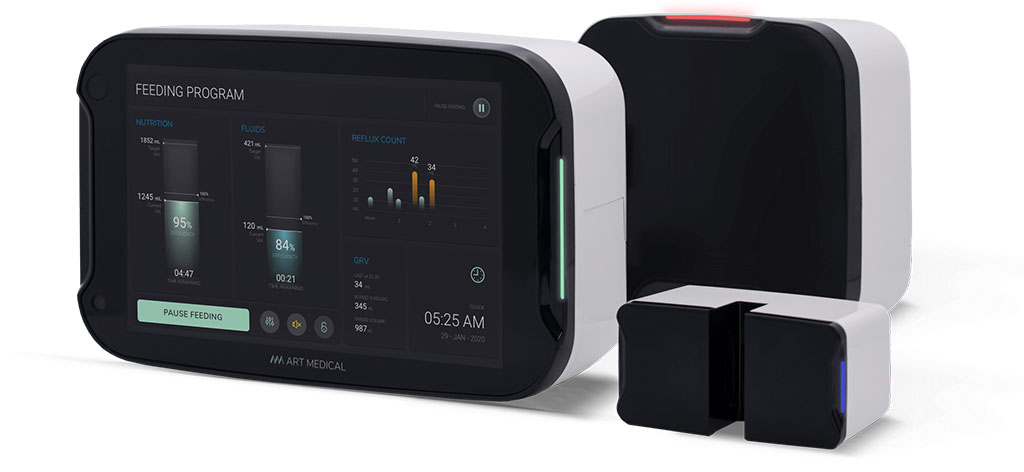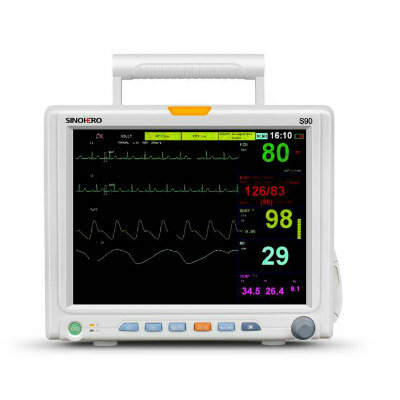Revolutionary Critical Care Technology Reduces Length of Stay and Ventilation in ICU
|
By HospiMedica International staff writers Posted on 26 Jul 2023 |

Complications acquired in the intensive care unit (ICU), such as aspiration pneumonia, malnutrition, and acute kidney injury associated with nutrition, present key challenges in critical care. The current standard of care, which depends on manual calculations to determine patient nutritional needs, can be inaccurate by up to 50%. This often leads to patients being underfed or overfed (resulting in malnutrition rates as high as 78%) — both situations correlate with increased mortality rates. Furthermore, uncontrolled reflux events pose a significant risk for aspiration and pneumonia. Routine medical procedures often interrupt feeding without compensating for the required nutrition, leaving most ICU patients achieving less than 60% of nutrition adequacy.
Existing solutions fail to sufficiently address these complex, interconnected complications. The current standard of care not only influences patient outcomes but also places an economic burden on hospitals, which are not reimbursed for additional costs incurred when treating ICU-acquired complications. This emphasizes the urgent need for effective cost-mitigation strategies. Now, a cutting-edge platform with integrated software and sensor-based tools is designed to detect and reduce the risk of feeding-related complications while enhancing feeding efficiency.
The smART+ Platform from ART MEDICAL (Netanya, Israel) continuously monitors nutrient delivery and automatically identifies and compensates for any feeding interruption, ensuring the appropriate nutrition is delivered and reducing the risk of malnutrition. The platform's sensors and monitoring technology also help identify acute kidney injury and potential reflux events, both of which can be life-threatening if not detected early. In the event of a change detected in the feeding tube position, the system promptly halts feeding and notifies the staff via an interface alert and an audible alarm. With the help of the sensors, clinical staff can easily reposition the tube. smART+ simplifies tube repositioning and automatically resumes feeding.
A comparative randomized study evaluating the performance of the smART+ Platform has shown that it can maximize feeding efficiency, achieving nearly 90% of the targeted nutrition goal, and enhance patient outcomes by reducing both the ICU length of stay and the length of ventilation by 3.3 days. This significant advancement paves the way for the commercialization of ART MEDICAL's revolutionary technology.
"Medical devices in critical care nutrition have had little to no innovation over the last several decades. Nutrition, while considered important, was never directly correlated to ICU length of stay," said Liron Elia, founder and CEO of ART MEDICAL. "The groundbreaking data of this study puts nutrition management front and center of critical care and proves that malnutrition and aspiration can only be treated holistically and in real time. Our evidence shows that by optimizing nutrition, we can dramatically improve patient outcomes. We are excited to introduce the smART+ Platform to the global market, providing clinicians with a powerful tool to elevate the standard of care in ICUs and help the sickest patients."
Related Links:
ART MEDICAL
Latest Critical Care News
- AI-Powered, Internet-Connected Medical Devices to Revolutionize Healthcare, Finds Study
- Starfish-Inspired Wearable Tech Enables Smarter Heart Monitoring
- AI Eye Scans Could Help Identify Heart Disease and Stroke Risk
- Digital Heart Twin Improves Diagnosis and Treatment of Cardiac Arrhythmias
- First-Of-Its-Kind AI-Powered Probability Scoring System Assesses Heart Failure with Preserved Ejection Fraction
- AI-Assisted Colonoscopy Detects More Polyps but Has Modest Effect on Cancer Risk
- Wearables Could Reduce Need for Continuous Blood Thinners in Patients with Atrial Fibrillation
- AI Model Provides Real-Time Sepsis Risk Alerts for Improving ICU Patient Survival
- AI Algorithm Improves Intravenous Nutrition for Premature Babies
- Smart Mirror Generates AI-Powered Health Insights by Analyzing Facial Blood Flow
- Painless Diabetes Patch to Replace Needle Pricks

- Sensory T-Shirt Monitors Patient’s Vitals After Urological Surgery for Cancer
- Super-Sensitive Radar Technology Warns of Serious Heart Issues
- Thermal Imaging Could Accurately Track Vital Signs for Early Disease Detection
- New Microfluidic Device Improves Safety of Leukemia Treatment for Children
- Precision Transfusion Approach Improves Outcomes in TBI Patients
Channels
Surgical Techniques
view channel
New Transcatheter Valve Found Safe and Effective for Treating Aortic Regurgitation
Aortic regurgitation is a condition in which the aortic valve does not close properly, allowing blood to flow backward into the left ventricle. This results in decreased blood flow from the heart to the... Read more
Minimally Invasive Valve Repair Reduces Hospitalizations in Severe Tricuspid Regurgitation Patients
The tricuspid valve is one of the four heart valves, responsible for regulating blood flow from the right atrium (the heart's upper-right chamber) to the right ventricle (the lower-right chamber).... Read morePatient Care
view channel
Portable Biosensor Platform to Reduce Hospital-Acquired Infections
Approximately 4 million patients in the European Union acquire healthcare-associated infections (HAIs) or nosocomial infections each year, with around 37,000 deaths directly resulting from these infections,... Read moreFirst-Of-Its-Kind Portable Germicidal Light Technology Disinfects High-Touch Clinical Surfaces in Seconds
Reducing healthcare-acquired infections (HAIs) remains a pressing issue within global healthcare systems. In the United States alone, 1.7 million patients contract HAIs annually, leading to approximately... Read more
Surgical Capacity Optimization Solution Helps Hospitals Boost OR Utilization
An innovative solution has the capability to transform surgical capacity utilization by targeting the root cause of surgical block time inefficiencies. Fujitsu Limited’s (Tokyo, Japan) Surgical Capacity... Read more
Game-Changing Innovation in Surgical Instrument Sterilization Significantly Improves OR Throughput
A groundbreaking innovation enables hospitals to significantly improve instrument processing time and throughput in operating rooms (ORs) and sterile processing departments. Turbett Surgical, Inc.... Read moreHealth IT
view channel
Printable Molecule-Selective Nanoparticles Enable Mass Production of Wearable Biosensors
The future of medicine is likely to focus on the personalization of healthcare—understanding exactly what an individual requires and delivering the appropriate combination of nutrients, metabolites, and... Read more
Smartwatches Could Detect Congestive Heart Failure
Diagnosing congestive heart failure (CHF) typically requires expensive and time-consuming imaging techniques like echocardiography, also known as cardiac ultrasound. Previously, detecting CHF by analyzing... Read morePoint of Care
view channel
Handheld, Sound-Based Diagnostic System Delivers Bedside Blood Test Results in An Hour
Patients who go to a doctor for a blood test often have to contend with a needle and syringe, followed by a long wait—sometimes hours or even days—for lab results. Scientists have been working hard to... Read more
Smartphone-Enabled, Paper-Based Quantitative Diagnostic Platform Transforms POC Testing
Point-of-care diagnostics are crucial for public health, offering rapid, on-site testing that enables prompt diagnosis and treatment. This is especially valuable in remote or underserved regions where... Read moreBusiness
view channel
Expanded Collaboration to Transform OR Technology Through AI and Automation
The expansion of an existing collaboration between three leading companies aims to develop artificial intelligence (AI)-driven solutions for smart operating rooms with sophisticated monitoring and automation.... Read more


















